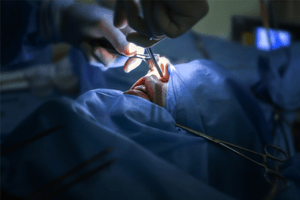Everyone has some degree of deviation to their nasal septum. Mild to minor septal deviations don’t usually require surgical correction. But that doesn’t mean they don’t cause problems. Even those with minor deviations are prone to breathing issues at some point during their lifetime.
Surgical septoplasty in Los Angeles is often recommended for patients with septal deviations and irregularities that are untreatable with medication. The procedure repairs the septum to improve the nose’s function. Continue reading this surgical septoplasty guide to learn everything you need to know about the procedure.
Is septoplasty minor or major surgery?
Septoplasty is a minor outpatient surgical procedure that is well tolerated by patients. Complication risks are very low, and patients heal and recover quickly. Surgery corrects the defects in the bone and cartilage to restore normal airflow and eliminate nasal congestion. Surgical septoplasty is an outpatient procedure that is performed entirely inside the nose.
Septoplasty: What you should know?
Having some deviation of the septum isn’t necessarily a bad thing. But for some, it prevents regular airflow or causes nasal irritation, congestion, sinus issues and frequent nosebleeds. People with severe septal deviations tend to experience severe breathing difficulties, frequent sinus infections, loud, noisy nasal breathing, mouth breathing, snoring, and poor sleep quality. These issues and more can be treated with surgical septoplasty in Los Angeles with expert surgeon, Dr. Alen Cohen.
Septum: What is it?
The septum is a thin, hard bony cartilage wall as well as a thin bony wall that separates the right nostril from the left. This mucous-covered structure helps guide inhaled air from the tip, front of the nose, to the back so that it enters the lungs. Most people don’t realize it, but having a straight septum is extremely rare. Anything that injures the nose can cause a septal deviation, including childbirth, sports, and motor vehicle accidents.
What are turbinates?
Inside the nose are small shelf-like structures that humidify and filter inhaled air that passes before it enters the body. Healthy turbinates are necessary to avoid breathing issues, frequent infections, and respiratory ailments. There are three sets of turbinates inside the nose, each essential to your overall health.
- Superior turbinates
- Middle turbinates (involved in sinus problems and sometimes sinus headaches)
- Inferior turbinates (involved in congestion issues)
The inferior turbinates are the largest and lowest of all turbinates. These structures normally swell and shrink in response to environmental temperature changes and in times of allergies and infections like colds or sinus infections.
When the turbinates, most notably the inferior, become irritated or overwhelmed by pathogens, they become dysfunctional, inflamed, or shrink. This can make breathing difficult and is commonly diagnosed in patients seeking treatment for breathing difficulties, chronic nosebleeds, chronic sinus infections, or a deviated septum.
Some people develop hypertrophic or dysfunctional turbinates because they have mild to severe deviations in their septum. With the septum, hypertrophied turbinates tend to occur on the opposite side from the septal deviation. In that respect both sides of the nose often get blocked.
In contrast, an enlarged turbinate on the opposite side of the septum blocks the other nostril. Surgery is often necessary to repair the septum and turbinates and drain the trapped mucus to restore breathing capacity.
Before Septoplasty Surgery: What to expect?

What are the risks of surgical septoplasty?
Surgical septoplasty is a surgery that is performed through the nose. In most cases, the procedure doesn’t require incisions or cuts to the external surface of the nose, so there is minimal tissue damage and trauma to the surrounding areas of the face. Still, there are risks involved with the procedure. The following post-operative concerns are extremely rare in Dr. Cohen’s expert hands:
- Septal perforation
- Decreased sense of smell
- Nerve damage
- Bleeding
- Congestion or nasal blockage returning
- Scar tissue formation
- Damage to surrounding structures
- Permanent numbness
- Redeviation of the septum
Rare patients may require additional surgeries to achieve their desired outcome. Revision septoplasty decisions are made on a case-by-case basis.
Nasal Septoplasty: What are the benefits?
Having some degree of deviation in the septum isn’t necessarily a bad thing, but for some, it can be. Fortunately, a septal deviation is among the most common conditions corrected with septoplasty. Nasal septum repair surgery corrects misalignment and structural irregularities of the septum to improve symmetry and function. Southern California Sinus Institute and Dr. Cohen’s patients notice a significant and long-term reduction in congestion and improvements in breathing capacity.
Schedule a Surgical Septoplasty in Los Angeles Consultation with expert nose and sinus surgeon, Dr. Alen Cohen, in West Hills
If your deviated septum makes it hard for you to breathe or makes you feel miserable, it’s time to see an ENT in Los Angeles at the Southern California Sinus Institute. Breathing shouldn’t and doesn’t have to be difficult just because you have a deviated septum or some other structural irregularities of the nose.
If you’re interested in learning more about surgical septoplasty and other types of nasal surgeries, please call (818) 888-7878 to schedule a consultation with world-renowned expert nose and sinus surgeon, Dr. Alen Cohen, at our West Hills, CA office.

